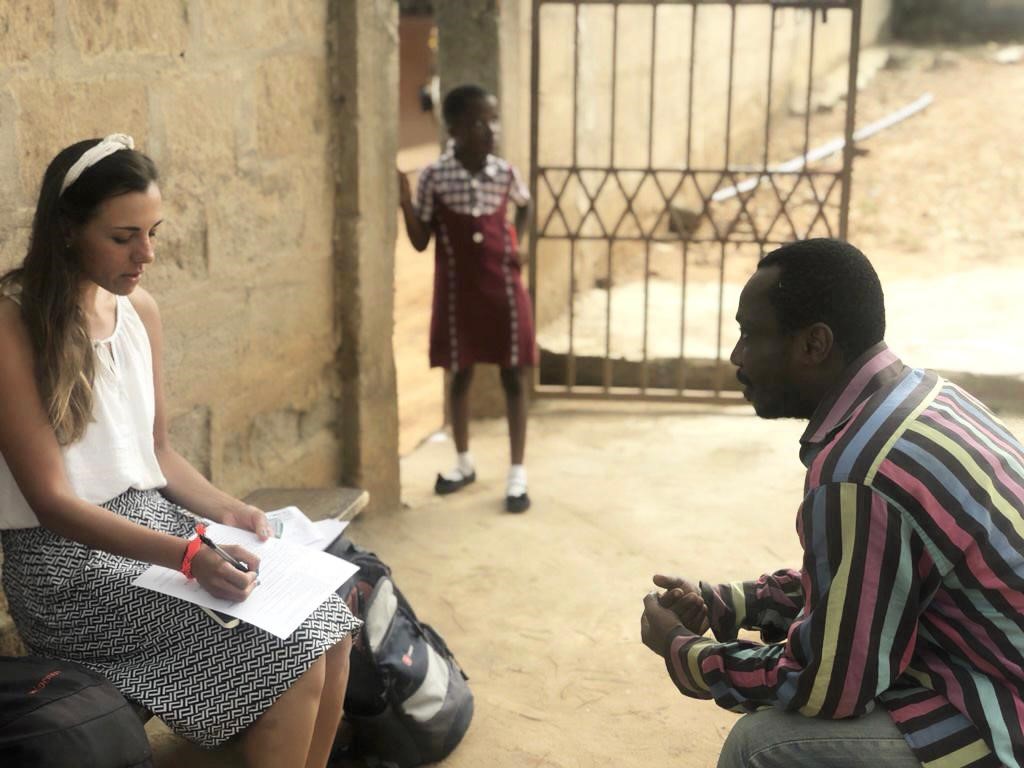by McKenzie Flowers Fergus

Our JPII Leader McKenzie Flowers Fergus (Cohort XII, USA) is conducting field research in Ghana for her PhD thesis. Here she shares with us an academic reflection on her work.
The prominent role religion plays in humankind’s search for meaning is ageless. Religion remains an important purveyor of meaning and morality by providing existential catharsis and ancient wisdom. Religious texts were the first works to declare how the essential fabric of existence weaved into being as well as the way life will one day stretch to its breaking point. T.S. Eliot wrote: “No culture can appear or develop except in relation to a religion.” Human development along with social advancement is wrapped up not only in the study of religion but how this past connects with the present age. In many areas, the discipline of religion has yet to be untangled from the past and examined in relation to contemporary times. Can the discipline of theology contribute to an era defined by globalization, the information age, and technological shifts? This article refers to “religious studies” and “theology” interchangeably as both are comparable as well as relevant to this discussion, which falls under essentially the same academic umbrella.
Roughly translated the Greek root word for theology, “theologia” means: “a reasoned talk about God.” After dedicating my studies to theology for ten years, my reasoned engagement with the field of religion has led to a practical application of lessons I have learned along the way. I question the meaning and value that the discipline of religion has in modernity as a Ph.D. candidate in the University of Edinburgh’s World Christianity program. My research area investigates the belief systems that influence the healing traditions of Ghanaian prayer camps as well as general mental healthcare treatment preferences.
Neo-Pentecostal prayer camps offer large-scale worship facilities along with faith-healing treatments for approximately 80% of Ghana’s mentally ill population. I am currently living in Ghana conducting the first religious study on the healing traditions that define the diagnoses and treatments administered at prayer camp sanitariums. I am gathering qualitative data conducting interviews with the staff of a prayer camp. I am also leading a project for the nonprofit, BasicNeeds-Ghana. I am interviewing 200 patients discharged from a prayer camp sanitarium and leading focus groups for patients that use psychiatric healthcare. This research data will be used to improve the sustainable development programs of BasicNeeds as well as advance funding opportunities, specifically from U.K. sources. The project is designed to inform advocacy programs and organizations.
Thousands suffering from mental illness are forced to eat, sleep, urinate, and defecate in chains at prayer camp sanitariums, including young children. Patients usually demonstrate psychiatric symptoms that are regularly diagnosed as spiritual-based phenomena caused by supernatural forces such as evil spirits or witches. Mentally ill persons are treated using faith-healing practices consisting of a combination of prayer, biblical teachings, forced fasting, and sometimes caning. Interconnected religious influences of indigenous and neo-Pentecostal traditions have largely characterized the assessment and treatments delivered to mentally ill persons at prayer camp sanitariums. In other words, prayer camps assess and treat psychiatric disorders by referencing a religious explanatory model.
There is an urgent demand during Ghana’s current period of mental health care reform to address longstanding religious beliefs about treatments for mental illness while improving healthcare conditions at prayer camp sanitariums. The correction of human rights violations at prayer camp sanitariums is listed as a major priority of Ghana’s recent law, Mental Health Act 846 (2012). The law prohibits the use of shackles as well as involuntary treatment methods for the mentally ill. However, the law is not enforced.
Government authorities and researchers acknowledge that studies will significantly inform the implementation of the law and advance its directives. Yet, a lack of literature exists on the theologies and traditions that define the faith-healing methods of prayer camps. Outside researchers and medical workers are generally uninformed about the extent to which belief systems determine the healing procedures of prayer camps. My research aims to serve as a reference work for foreign researchers and development project collaborators to understand the under-researched intersection of mental illness and traditional healing at prayer camps.

Interfaith dialogue is another example of a religious studies area that connects with the modern age. Interreligious dialogue not only advances narratives working toward justice and peace but serves to bridge many differences. It presents ways to address pressing needs of ongoing religious divisions, polarization and conflicts that fuel wars, injustices, and general persecution.
Now it is time for the discipline of theology—the once esteemed highest science or, the “Queen of the Sciences”— to turn to interdisciplinary approaches. New methods not only lead to answers to challenging and consequential questions but present opportunities for the religious discipline to connect and reason with the modern age. Our world is rapidly changing at record-breaking rates while the components and methods of theological studies abide unchanged. Although theological lessons present wisdom that is practically useful today, these lessons are rarely applied. It is not that the tradition or substance of the discipline should change, but that great thinkers wielding theological reasoning are obliged to consider anew how their findings can present valuable contributions to society.
Throughout history, the meaning and purpose of religious studies centered on knowing God—serving as the beacon of enlightenment for the Western world till universities took over in the 13th century. To know God is to know a transcending love (1 Corinthians 13:12–13); one that we were created to give to others. A love that we were also created to share with our neighbor. Religious studies scholars may demonstrate their propensity to have “a reasoned talk with God,” but if their works do not contribute to a cause worthy of knowing God theological contributions will only remain like a “noisy gong or a clanging cymbal” (1 Corinthians 13:1). New theological approaches present opportunities for uncovering ageless mysteries dawning from the brink of creation. If practically applied, such lessons hold consequential meaning for the advancement of humanity. All people can benefit from religious scholars re-envisioning the potential and practicality of theology.
On the journey toward discovering and embodying truths, scholars must search for meaning in new and unforeseen ways. Perhaps this academic endeavor involves engaging interdisciplinary fields or merely thinking “out of the box.” Certain theological areas need to practically connect with the modern era by contributing useful insights and tools for the advancement of the academic field and the layman’s connection with her world. The discipline of religious studies cannot present important answers if it is bound to hide behind the walls of places of worship or remains in the echo chambers of ivory tower institutions.
McKenzie Flowers Fergus is engaged in various human rights, anti-discrimination, sustainable development, and peace-building organizations. She has an M.Div. from Yale University and is a Russell Berrie Fellowship alumna (Cohort XII). She also received her degree in Interreligious Studies at the Pontifical University of Saint Thomas Aquinas in Rome. Presently she is a Ph.D. Candidate in the World Christianity program at the University of Edinburgh.
